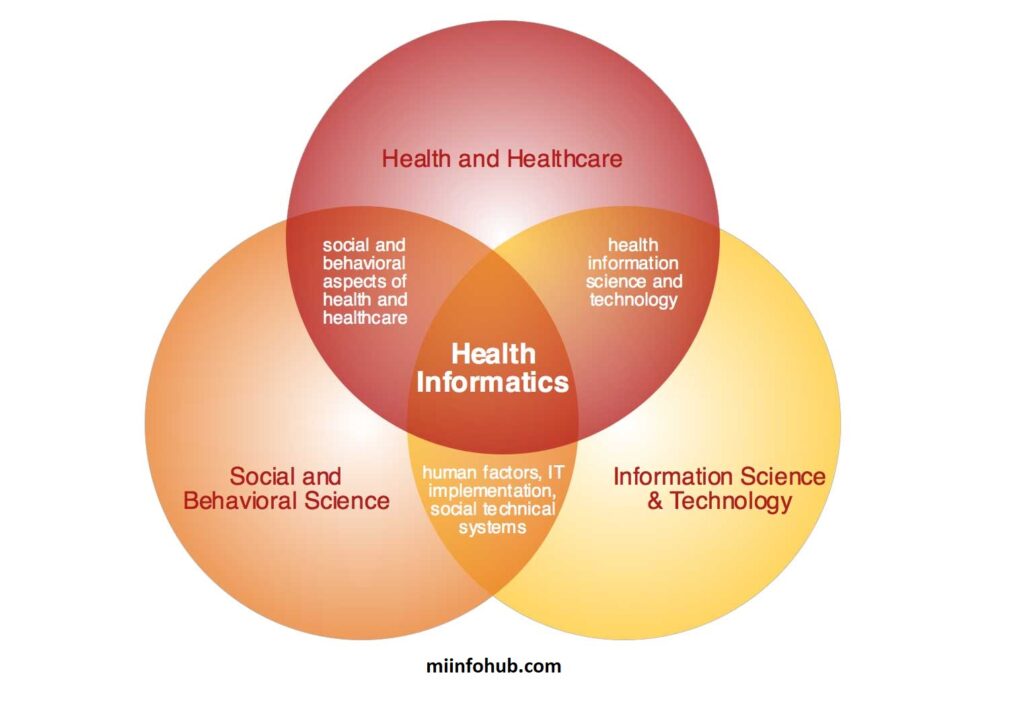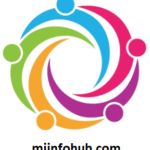Health Informatics Specialist is a growing field that merges healthcare and technology. As a health informatics specialist, you’ll leverage data to enhance healthcare systems, streamline patient record management, and analyze trends to improve care delivery. This role is crucial as it helps healthcare organizations make informed decisions based on data insights, ultimately leading to better patient outcomes and operational efficiency. If you’re interested in pursuing a career in this dynamic and impactful field, here’s a step-by-step guide to help you get started.

What Is A Health Informatics Specialist?
A Health Informatics Specialist is responsible for managing and analyzing healthcare data effectively. They collaborate closely with doctors, nurses, and IT professionals to optimize the use of health information systems. This role often involves enhancing electronic health records (EHR), ensuring that they are user-friendly and efficient. Additionally, specialists are tasked with maintaining the security and accuracy of patient data, protecting sensitive information from breaches. They also analyze data trends to support clinical decision-making and improve patient care. By bridging the gap between healthcare and technology, health informatics specialists play a vital role in enhancing healthcare delivery and patient outcomes. If you are intrusted about behavioral health specialist then click here.
Educational Requirements
Bachelor’s Degree
Start with a bachelor’s degree in a related field such as health information management, computer science, or healthcare administration. Courses in data management, healthcare systems, and IT will be especially helpful.
Master’s Degree (Optional but Recommended)
For better job opportunities, consider a master’s degree in health informatics or healthcare IT. Programs often focus on advanced data analysis, EHR management, and health information laws.
Relevant Experience
Internships And Volunteering
Gaining practical experience during or after your studies is crucial for becoming a successful Health Informatics Specialist. Look for internships at hospitals, clinics, or health IT companies that focus on health information systems. These internships allow you to apply theoretical knowledge in real-world settings, giving you insights into data management and healthcare workflows. Additionally, volunteering in healthcare environments can provide valuable hands-on experience in managing health data. Engaging in these opportunities not only enhances your resume but also helps you build a professional network, connecting you with industry experts who can offer guidance and potential job leads.

Certification And Licensing
- Importance Of Certifications:
- Earning certifications is essential for enhancing your professional credentials and improving job prospects in the competitive field of health informatics. These certifications demonstrate your knowledge and skills to potential employers and can set you apart from other candidates.
- Popular Certifications:
- Certified Health Data Analyst (CHDA):
- Focuses on the analysis, interpretation, and management of health data.
- Validates your ability to improve healthcare outcomes through data analytics.
- Registered Health Information Administrator (RHIA):
- Centers on managing health information systems and ensuring regulatory compliance.
- Prepares you for leadership roles in health information management, focusing on quality and security of health data.
- Certified Professional In Health Informatics (CPHI):
- Showcases your expertise in health informatics, including the integration of healthcare and IT.
- Covers topics like data governance, health IT infrastructure, and the management of health information systems.
- Certified Health Data Analyst (CHDA):
- Benefits:
- Boosts Your Resume: Certifications enhance your professional profile, making you more attractive to employers.
- Staying Updated: Earning and maintaining certifications requires ongoing education, helping you stay informed about the latest trends, technologies, and best practices in health informatics.
- Increased Competitiveness: Certifications often lead to better job opportunities, higher salaries, and career advancement, giving you an edge in the job market.
Key Skills Needed To Succeed
To succeed as a Health Informatics Specialist, you’ll need a blend of technical, analytical, and interpersonal skills. Here are the key skills essential for this role:
- Data Analysis:
- Proficiency in managing and interpreting healthcare data is crucial.
- You should be skilled in using data analytics tools and software to extract meaningful insights from large datasets.
- Understanding statistical methods to analyze trends and patterns in healthcare data enhances decision-making and improves patient outcomes.
- Technical Proficiency:
- A strong understanding of health information systems is vital.
- Familiarity with Electronic Health Record (EHR) platforms and other health IT applications is necessary to streamline data management and ensure compliance with regulations.
- Knowledge of database management and programming languages (like SQL) can be advantageous in managing health data systems effectively.
- Problem-Solving:
- The ability to troubleshoot and resolve issues within health information systems is important.
- You should be capable of identifying potential problems and implementing solutions that enhance the efficiency and effectiveness of health data management.
- This skill involves critical thinking and a proactive approach to improving existing systems.
- Communication:
- Strong communication skills are essential for collaborating with healthcare professionals and IT teams.
- You need to effectively convey complex technical information to non-technical stakeholders, ensuring everyone understands the implications of health data decisions.
- Building relationships with interdisciplinary teams fosters a collaborative environment, improving overall healthcare delivery.

Typical Workplaces
Health informatics specialists are employed in diverse environments, each playing a crucial role in enhancing healthcare delivery through effective data management. Here are some common workplaces for health informatics specialists:
- Hospitals:
- Specialists in hospitals focus on managing and improving Electronic Health Record (EHR) systems.
- They ensure that patient data is accurately captured, stored, and easily accessible to healthcare providers.
- Their work often involves training staff on EHR usage and ensuring compliance with healthcare regulations.
- Clinics:
- In clinics, health informatics specialists work to ensure smooth data exchange between various healthcare providers.
- They streamline workflows and enhance communication by integrating systems that facilitate information sharing.
- Their efforts improve patient care coordination and ensure that all providers have access to up-to-date patient information.
- Research Institutions:
- Specialists in research institutions analyze health data for research purposes, contributing to advancements in medical knowledge and patient care.
- They work with large datasets to identify trends, evaluate treatment outcomes, and support clinical trials.
- Their analysis helps researchers and policymakers make informed decisions based on evidence-based findings.
- Government Agencies:
- Health informatics specialists in government agencies help manage large-scale health databases that are vital for public health initiatives.
- They ensure the accuracy and security of health data used for monitoring diseases, tracking health trends, and informing policy decisions.
- Their work supports efforts to improve population health and ensure compliance with health regulations and standards.
Salary Expectations
| Experience Level | Salary Range (per year) | Details |
|---|---|---|
| Entry-Level | $50,000 – $70,000 | Entry-level positions are typically for recent graduates or those new to the field. Roles may include data entry, assisting in EHR management, or basic data analysis. Salary can vary based on location and organization size. |
| Mid-Level | $70,000 – $90,000 | Mid-level specialists have a few years of experience. They may manage projects, optimize EHR systems, and lead data analysis efforts. Their responsibilities are more complex, often requiring specialized knowledge and skills. |
| Experienced | $90,000+ | Experienced specialists often hold leadership roles or specialized positions. They may oversee teams, develop health informatics strategies, and contribute to research initiatives. Their extensive experience and expertise command higher salaries. |
Common Challenges In Health Informatics
Managing Large Volumes Of Sensitive Data
Health informatics specialists handle extensive amounts of sensitive patient information. Ensuring the accuracy, security, and confidentiality of this data can be daunting. Mismanagement can lead to breaches of patient privacy and legal consequences.
Adapting To Rapid Technological Advancements
The healthcare technology landscape is constantly evolving. Specialists must stay updated with new tools, software, and best practices. This requires ongoing learning and flexibility to adapt to changes quickly.
Ensuring Compliance With Healthcare Regulations
Adhering to laws like HIPAA (Health Insurance Portability and Accountability Act) is essential. Specialists must ensure that their practices comply with regulatory standards, which can be complex and demanding.

Rewards Of A Health Informatics Career
Improving Patient Care Through Technology
Specialists play a critical role in enhancing patient care. By optimizing health information systems and implementing effective data management practices, they help healthcare providers make informed decisions, leading to better patient outcomes.
Playing a Key Role in Advancing Healthcare Systems
Health informatics specialists contribute to the modernization of healthcare systems. Their work supports the integration of technology in healthcare, paving the way for innovative practices and improved service delivery.
High Demand for Skilled Professionals in a Growing Field
The demand for health informatics specialists is rising. As healthcare increasingly relies on data, professionals in this field are sought after. This demand often translates to job security and competitive salaries.
Future Trends In Health Informatics
The field of health informatics is poised for significant advancements in the coming years. Here are some key trends shaping its future:
Interdisciplinary Collaboration
As the healthcare landscape becomes more interconnected, collaboration among professionals from various disciplines will be essential. Health informatics specialists will work closely with IT experts, healthcare providers, and administrators to create cohesive and efficient systems that enhance patient care.
Increased Use of Artificial Intelligence and Machine Learning
Artificial intelligence (AI) and machine learning are transforming how healthcare data is analyzed. Health informatics specialists will increasingly rely on these technologies to uncover patterns, predict outcomes, and improve decision-making. Staying updated on these innovations will be essential for effectively managing complex data systems.
Growth of Telemedicine and Remote Healthcare
The rise of telemedicine is revolutionizing patient care. As more healthcare services are delivered remotely, the integration of data across various platforms will become crucial. Health informatics specialists will play a pivotal role in ensuring that data flows smoothly and securely between telemedicine platforms and traditional healthcare systems.
Focus on Data Security and Compliance
With the growing complexity of healthcare data systems, the emphasis on security and compliance will intensify. Specialists will need to implement advanced security measures to protect sensitive patient information and adhere to evolving regulations.

Continuing Education
Healthcare and technology are always evolving, making it essential for health informatics specialists to stay updated. Engaging in continuing education will enhance your skills and knowledge. Consider attending:
- Workshops: Participate in hands-on workshops to learn about new tools and technologies in health informatics.
- Conferences: Attend industry conferences to network with professionals and gain insights into the latest trends and best practices.
- Online Courses: Enroll in online courses that cover emerging topics in health informatics, such as data analytics, cybersecurity, and health IT innovations.
Conclusion
Becoming a health informatics specialist is a rewarding career that merges healthcare with technology. This field allows you to play a crucial role in improving patient outcomes through data management and analysis. By earning a relevant degree, gaining hands-on experience through internships or volunteering, and obtaining professional certifications, you can establish a solid foundation for your career.
Additionally, staying updated with industry trends, technological advancements, and emerging practices is essential for success. With the increasing reliance on data-driven decisions in healthcare, the demand for skilled health informatics specialists continues to rise.
This evolving landscape offers numerous opportunities for specialization in areas such as data analytics, telemedicine, and health information security. Whether you aspire to work in hospitals, research institutions, or government agencies, the skills you develop will be invaluable in navigating the complexities of modern healthcare. Embrace the journey and take the first steps toward a fulfilling career in health informatics, where you can make a significant impact on the future of healthcare delivery.

